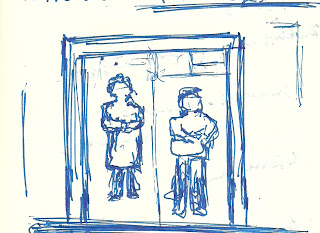'Wastwater' review or 'Please read the safety instructions before take off.'
'Wastwater', Simon Stephens
Royal Court Theatre, Tuesday 5th April
Written for Culture Wars
In a podcast for the Royal Court, Simon Stephens jokes about the mission statement behind his new play 'Wastwater': 'We are bringing dirt back to the Royal Court.' But the trouble with this elliptical triptych is that it's not nearly dirty enough.
This combination of seemingly separate strands is not new for Stephens. In fact, it’s one if his hallmarks. Stephens is brilliant at conjuring up random encounters and using them to explore the persistent tension between free will and fate. In 'Harper Reagan' or 'Pornography’, Stephens revels in the spontaneity of mankind, whilst also insisting on the unspoken bonds that bind us. He loves to tease his audience with oblique links, reminding us that, no matter how strongly we might believe we're forging our own path, something or someone bigger might just be paving the way.
This is the paradox Stephens loves to luxuriate in – the strain between man's supposed freedom and innate interdependence - and it is a preoccupation that often creates surprising and insidiously unsettling plays. But in 'Wastwater', the links between Stephens' characters are carved out all too clearly and the themes pulled out too exactly. The unexpected becomes predictable.
All three plays involve planes – indeed, they whoosh over the characters' head with increasing emphasis as the stories unfold. We open on the outskirts of Heathrow, where a foster mum is seeing off her favourite son, as he prepares to start his own life abroad. It is easily the most arresting of Stephens' short pieces and is an episode that shimmers with silent love, gratitude and fear. The set is subtly symmetrical: mother and 'son' stand within a garden door, trellis creeping in around them, a black box neatly framing the entire picture. Lizzie Clachlan's design is both unruly and highly ordered; a wild environment, tamed and restrained by human intervention.
This juxtaposition of order and anarchy emphasizes the bristling contradictions contained within this tiny family. Mum, Frieda (Linda Bassett- a compelling bundle of erratic energy), appears on first glance a typical earth mother: scatty, warm and self-deprecating. And yet, clues hint at a dangerous spark that burns beneath: blood starts to drip down her leg and we learn she's been scrambling over fences. Her laugh is a growl. 'I'm a bit of a savage,' she proclaims to her son – and gradually, we begin to believe her.
 |
| Linda Bassett (Frieda) and Tom Sturridge (Harry) Photo Credit: Stephen Cummiskey |
Son, Harry (a beautifully detailed performance from Tom Sturridge) is equally contradictory. His face is permanently set in a scowl and yet his voice is gentle. His posture is defensive - but it is this surly man who finally asks for a hug. He seems determined to set out on his own, yet he hugs and claws at himself throughout. It is a rather beautiful opening scene and contains a final surge – all blood, honesty and love ('Don't die!) - that could only come from Stephens' pen.
The scene snaps shut, a black curtain falls and suddenly glows white, squares within squares throbbing against each other. This is one of Katie Mitchell's most intriguing touches. As we reach the last play, these empty boxes seem to represent the sum of silences contained within every scene.
The shabby exterior of the first play is usurped by an anonymous looking hotel room, its green colour scheme the only visual connection to the scene before. The planes swoop thunderously overhead; louder this time, since a couple on the verge of adultery are hiding out in a Heathrow hotel. Again, this is a play more concerned with the gaps between the words. A man and woman circle the limits of the room, edging closer to the bed. The space between what these people want to do – and what they actually say – is spread far wider than the earlier scene. The disjunction between the façade these characters present, the jobs they do, and the desires they hide, becomes massive.
Of course, this tension is always present in a scene involving adultery, but it is particularly acute in this scenario. No more so than with Lisa – a policewoman who has struggled with a heroin addiction and participated in soft porn. The more she confesses, the more her skin seems to stretch away from her public persona. She exerts this same tension on poor Mark – the supposed seducer but really Lisa's plaything. She asks him to hit her. When he finally does, he cries. In fact, everyone cries here and it is often at the moment you might consider them at their most powerful.
 |
| Jonathan (Angus Wright) Photo Credit: Stephen Cummiskey |
In the final play, this gap between private and public, desire and action, reaches epic proportions. Gradually, we have been moving further and further away from nature. So, whilst we begin outside, we end in an underground car park, devoid of natural light. It is a place so deeply hidden that even the planes can’t reach it. Here, in this half light, a man pays an exceptionally vicious woman an awful lot of money to 'adopt' a child. His desperate desire to love has led him to partake in an act of unfathomable cruelty.




Comments
Post a Comment